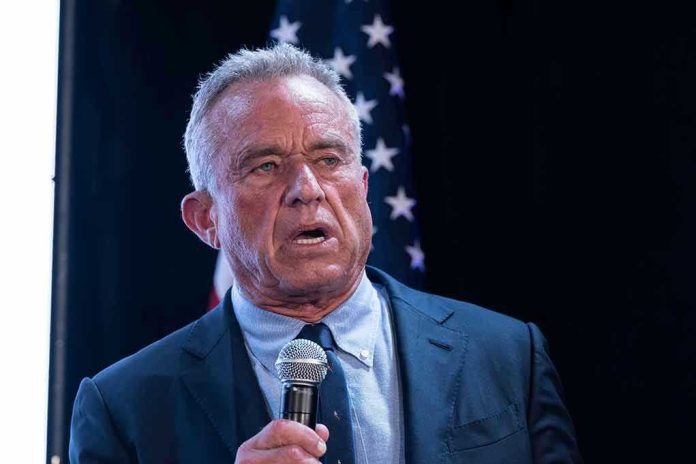
RFK Jr.’s recent claims about teenage sperm levels have sparked a firestorm of debate, raising questions about public health and scientific consensus.
Story Overview
- RFK Jr. claims teenagers have lower sperm and testosterone than older men.
- Link made between fertility rates and national security.
- Event aimed at promoting fertility drug access was overshadowed.
- Debate centers on scientific validity and political implications.
RFK Jr. Raises Alarming Concerns
At a recent White House event, Robert F. Kennedy Jr. made startling claims about the health of American teenagers, suggesting that their sperm and testosterone levels are lower than those of men aged 65. He linked this issue to a broader decline in national fertility rates, framing it as a national security threat. This assertion has been met with both curiosity and skepticism, as it intersects with ongoing debates about chemical exposures and public health.
'Wait Wait—' Fox News Host Stunned by Wild RFK Rant About Sperm Counts and Teenagers' Testosterone https://t.co/Ra228teL2q
— Mediaite (@Mediaite) April 23, 2025
The event, intended to promote a new initiative for discount fertility drugs, took an unexpected turn as Kennedy’s remarks shifted the focus to broader health concerns. Dr. Mehmet Oz and other officials present also weighed in on fertility and IVF reforms, but Kennedy’s comments have since dominated media coverage and public discourse.
Scientific Claims Under Scrutiny
The scientific community is divided over the validity of Kennedy’s claims. While studies have indicated a decline in sperm counts globally, the specific assertion that teenagers’ levels are lower than older men’s is contentious. Experts emphasize the need for more comprehensive data on adolescent sperm and testosterone levels, and caution against drawing definitive conclusions from limited evidence.
RFK Jr. has a history of making similar claims, often linking health issues to chemical exposures and food additives. These statements resonate with some political and cultural narratives but lack unanimous support from the scientific community. The debate highlights the challenges of navigating complex health issues in the public arena.
RFK Jr: "Today the average teenager in this country has 50% of the sperm count, 50% of the testosterone of a 65 year old man. Our girls are hitting puberty 6 years early … our parents aren't having children." pic.twitter.com/cWdB1aIqKG
— Molly Ploofkins (@Mollyploofkins) October 17, 2025
Political and Cultural Ramifications
RFK Jr.’s comments have sparked a broader discussion about the politicization of health science. By framing declining fertility as a national security issue, he has tapped into longstanding cultural anxieties about masculinity and virility. This approach aligns with certain pro-natalist movements and reflects a growing trend of using public health concerns to support policy agendas.
The Trump administration’s involvement provides a high-profile platform for these discussions, emphasizing fertility and reproductive health as key policy areas. This dynamic illustrates the intersection of science, politics, and cultural narratives in shaping public perception and policy direction.
Regulatory and Industry Implications
The event has also spurred regulatory and industry responses. The FDA and Health Department have announced plans to phase out several artificial food dyes by 2026, citing concerns about their impact on health. This move aligns with Kennedy’s broader health advocacy, though it presents challenges for the food industry, which may face increased regulatory scrutiny and reformulation pressures.
As regulatory efforts evolve, the food and beverage industry, healthcare providers, and prospective parents are all stakeholders in the outcome. The ongoing debate underscores the complexity of balancing scientific evidence, regulatory action, and public concern in addressing health and environmental issues.












